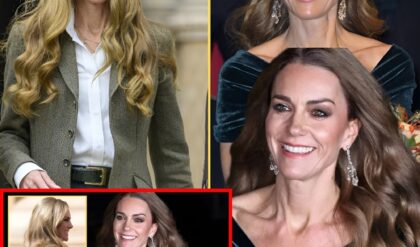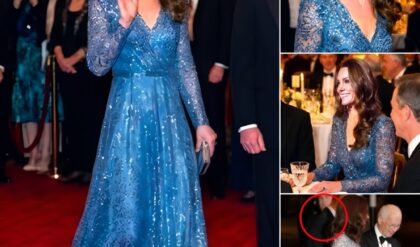
Rare kudos to Emily for resisting the temptation to add a beret to her ensemble here. Photo: Stephanie Branchu/NETFLIX
The mythological quality around Paris is strong. Like, “seemingly unassailable” strong. That’s why the clichés tethered to it, including the ol’ American-in-Paris one, keep on keeping on. Netflix’s Emily in Paris doesn’t shake up the dreamy view of the French capital. Helmed by Darren Star, creator of Younger and Sex and the City, it’s a frothy narrative with an ooh la la touch.
Realism has never been Star’s signature, but a semblance of it would stem the alternative: trivializing a foreign culture already so subject to parody. The titular Emily (Lily Collins) makes a transatlantic move not because she is swayed by the culture; she replaces her American superior during a merger with a French luxury marketing company for logistical reasons. On site, her imperviousness sets off one wince après another. She so grossly misreads French culture — and creates such an unflattering portrait of American youth — that it sabotages the show’s occasionally observant moments of cultural compare and contrast.
There are lots of faux pas in Emily: Emily’s hot love interest from the provinces somehow speaks impeccable English and has a schedule no one who has ever worked in hospitality could vouch for; Emily gets confused by her apartment building’s floors and the way the date is written; berets are worn as sincere style affects. But the most egregious oversight, which accounts for the show’s overall artificiality, is Emily herself, who shows zero personal growth over a ten-episode arc. The show’s creators may view Emily’s ignorance/arrogance with some side-eye, but mostly the show is intended as lightweight and mollifying, a by-proxy fantasy for viewers to “travel” to the City of Light. Yet featuring a character who never rethinks her personhood, whose sense of imagination and purpose flares only when she is scheming brand strategy, conjures not only an enormous amount of secondhand embarrassment but speaks to her flatness as a protagonist.
Emily’s vapidity is baffling to anyone who has moved from their native country. Being displaced — even from a position of absolute privilege — creates a minor revolution to your sense of what is normative. When faced with new surroundings, customs, and even intonations, where you fit and what you want and how much you can or wish to adapt is called into question. It’s a jarring exercise to review your own needs and desires, however slightly, as a function of where you are. It is also exhausting, confusing, infuriating, and enriching.
I myself made this move, from New York City to Paris, over 12 years ago. I have lived here since. I was motivated neither by romance nor by a specific professional opportunity, but I wanted to untangle myself from where I was and be somewhere new. When I arrived, I had no anchors. I had to find them, or create them, because suddenly there were different conceptions of what you could enjoy and how you could spend your time and what felt essential. Unlike Emily’s, my solutions to tackling these uncertainties did not involve hashtags and handbags. And very much unlike Emily,I had learned the language much earlier; I grew up in New York with a French father, and he treated his native tongue with a seriousness that veered into coercion. I squirmed while he assigned grammar exercises and made me memorize verb tenses from a workbook he bought at FNAC (a French Barnes & Noble–Best Buy hybrid). He was strict and punishing, like every French teacher who has ever existed.
Years of ruthless revision made my French structurally sound, but when I actually moved to Paris, I realized I was still very clearly a foreigner. I, like Emily, was huffy about the absence of customer service, would get stuck in dark staircases pawing frantically to find the timed light switch, and dearly missed friendliness. Among other you’re-clearly-not-from-here giveaways, I spoke “dad French” — my turns of phrase were stiff and outdated; I knew absolutely no slang. The struggles of conversing naturally and precisely, with words shaped by local wear, took time to work out. No matter what your relationship to a culture is, if you didn’t grow up in it, you will always be amending your grasp of it.
Not so for Emily; she amends nothing. Her only reappraisal, once on the other side of the ocean, is tied to social media. Right away, she changes her Instagram handle from @EmilyCooper to @emilyinparis (I picture it enunciated with the same mania applied by John Early and Kate Berlant) and churns out incredibly pedestrian selfies. Her follower count rises exponentially from 48 to 20K in under four episodes. She is even invited to an influencer extravaganza, where one of the fellow guests is a golden retriever with 100K followers.
When her sadistic French boss instructs Emily to delete her Instagram account, she laments, “I’m not sure who I am in this city without @EmilyinParis.” That is how lightly she’s bound to the city: Her identity is gone without her feed and filters. “You treat the city like it’s your amusement park,” the boss, Sylvie (Philippine Leroy-Beaulieu), says to her disdainfully. The assessment is apt. Emily regards her surroundings as little more than set pieces. In fact, Emily’s only ready references flatten the culture to an excruciating degree. “The entire city looks like Ratatouille,” she exclaims without a speck of irony. She tells a semiotics professor who hits on her at Café de Flore (… ugh) that she read The Second Sex — well, part of it, LOL! When her dreamboat downstairs neighbor tells her he is from Normandy, she situates it thusly: “Oh, I know that beach! Saving Private Ryan.”
At first glance, Emily’s American-in-Paris cartoonishness may seem to have continuity with a previous Star leading lady, Carrie Bradshaw. But even Carrie — who pulled up to the Plaza Athénée in horizontal stripes in the penultimate episode of Sex and the City — managed to communicate the profoundly melancholic nature of experiencing a culture alone, when even the most banal things feel puzzling or, worse, overwhelming.
Meanwhile, Emily trills her approach in the first episode: “Fake it till you make it!” Does she … somehow think she can fool a French person regarding her language skills? She introduces herself, in English, to her new professional French team with “I did Rosetta Stone on the plane, but it hasn’t kicked in yet.” (The reaction is deadpan.) No one picks up a new language or new touchstones right away, but chirping “bun-jer” is not “making an effort,” and attending two language classes thereafter doesn’t cut it either, chérie.
Emily’s obliviousness is called out regularly, and she does little more than balk in response. When her colleague Luc (Bruno Gouery) spots her drinking haplessly after her second day at work, he apologizes for participating in the earlier office hazing but then counters, “You came to Paris, and you don’t speak French — that is arrogant.”
“More ignorant than arrogant,” Emily says defensively.
“Let’s call it the arrogance of ignorance,” Luc levels at her.
Emily uses the fact that she was sent to a French company to “bring an American point of view” as a very literal justification for culturally one-sided behavior. There’s no pretense of her being a Francophile (unless ordering “white wine — anything French!” at a fluorescent-lit sports bar in Chicago before her departure counts). She clearly didn’t anticipate anything other than a midwestern future shilling pharmaceuticals and settling down with her bro-ey boyfriend. That’s fine! Fetishizing French culture is overrated, and disrupted life plans can be hard to recalibrate. But when her model changed, there wasn’t even the slightest attempt at engagement with her new milieu. Even her wardrobe emphasizes her complete misunderstanding of the local aesthetic. Paris, admittedly, has a relatively narrow definition of style — to pilfer wisdom from a different show, “Chic means boring,” Fleabag says, “Don’t tell the French” — but her choices are disproportionately flashy. It’s yet another set of social cues Emily doesn’t pick up.
In fact, all of the show’s deconstruction of the French cultural landscape is relayed to Emily secondhand. It’s mostly thanks to her friend Mindy (Ashley Park), a disgraced Chinese heiress turned nanny who considers Sancerre “a breakfast wine” and is without question the real star of the show. A second key resource for Emily is her wry colleague Julien (Samuel Arnold), who traffics in office gossip and provides French equivalents for essential terminology like horny and basic bitch. All Emily adds to the equation is constant surprise that Paris does not remind her of Chicago.
The underlying assumption is that, as a certain kind of pretty girl, Emily probably thinks she can get away with her ignorance and arrogance — which she basically does. Every male she encounters chides her for not learning French, then mostly just wants to sleep with her. But her language negligence really reflects a larger cultural danger of not paying attention, of not being inquisitive, of using the surrounding world not as a means through which to learn, but solely to market as “experience.” Her skyrocketing social media speaks to this problem: that she is performing her Parisian life for the validation she gets from an intangible online audience, not for the locals. We all perform to some degree — but Emily is not, in tandem, genuinely absorbing a single new thing.
What is the point, ultimately, of using the American-in-Paris cliché if not to spur a revisionist take on it? The designations “American” and “young woman” are already susceptible to ridicule. With such built-in bad perceptions, presenting a more substantial protagonist very much seems like a worthwhile goal. Because the condescension thrown Emily’s way is not without merit. Does anyone want to see a witless American stammer her way through the menu? No more than anyone wants to hear about a French girl’s casual-yet-meticulous beauty routine. Such caricatures are tiresome and far from the only depiction of young women available. It would be nice, for once, to feature a more compelling one.





